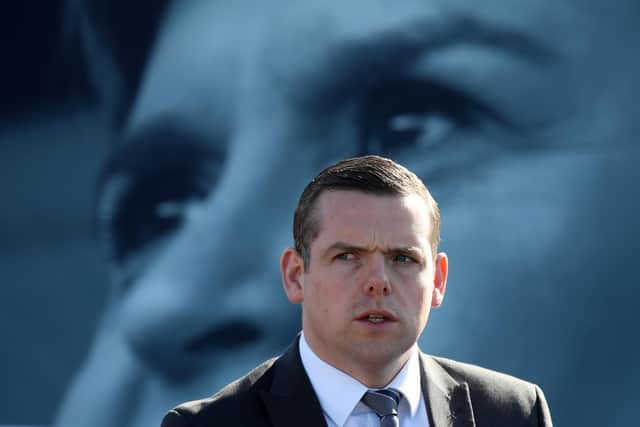Downing Street garden party: Why Douglas Ross has gambled his political future on that of Boris Johnson
From Jacob Rees-Mogg’s derisory “lightweight” descriptor to Michael Gove’s patronising Elgin comment, it is clear the Scottish Tory leader has few friends at the top of his own party.
His decision to break ranks on Wednesday and call for the resignation of the Prime Minister over the ongoing calamity of ‘Partygate’ is the gamble of Ross’ political career.


Advertisement
Hide AdAdvertisement
Hide AdThe choice of words prior to Boris Johnson’s appearance in front of MPs on Wednesday set the chain in motion, essentially tying himself to the hope the Prime Minister was not stupid enough to have actually attended the ‘bring your own booze’ work event.
After PMQs, Ross was presented with a set of options of which only one was the viable response. Demand the PM’s resignation, send in a letter to the 1922 committee.
Those choices – while matching both the mood of the public and of his own group of MSPs who unanimously backed the resignation call – is still a significant gamble.
In calling for the PM to go, Ross has tied his own political future to that of the Prime Minister.
If Johnson steps down, the Scottish Tory leader is vindicated, but could face the anger of local activists at the ballot box for the local elections in May.
The SNP will also never let Ross forget that he was one of the MPs who put Johnson into power, while the civil war between the Scottish arm and UK headquarters of the Conservatives will be pounced upon by both Labour and the nationalists.
More troubling is what happens if the teflon-esque Johnson manages to ride this latest controversy out.
Ross will be faced with the prospect of his councillors defending the, by Ross’s own admission, indefensible ahead of the elections.
Advertisement
Hide AdAdvertisement
Hide AdShould the Prime Minister lead the Conservatives into another general election, any credibility of Ross asking voters to vote him back into power would be lost before the campaign had even begun.
And what of the Scottish Conservative party itself?
This episode has shown the disdain and irrelevance of the MSP group to London. How else can you interpret the comments from senior ministers?
Some, as Adam Tomkins and Murdo Fraser have argued in the past, may call for the Scottish branch to split permanently from England.
The comments from Gove and Rees-Mogg make this more likely than ever, but the optics of independence being acceptable for the Scottish Conservatives, but not the Scottish people, will not be lost on Nicola Sturgeon.
Such a move could fatally undermine the unionist cause and almost certainly open doors for Scottish Labour.
For Ross, the situation is close to irretrievable even though he retains the support of his MSP group.
He has pinned his hopes of a continued career at the sharp end of Scottish politics on the future of a man who shows no regard for anyone but himself.
It is a monumental gamble.
A message from the Editor:
Thank you for reading this article. We're more reliant on your support than ever as the shift in consumer habits brought about by coronavirus impacts our advertisers.
If you haven't already, please consider supporting our trusted, fact-checked journalism by taking out a digital subscription.
Comments
Want to join the conversation? Please or to comment on this article.

